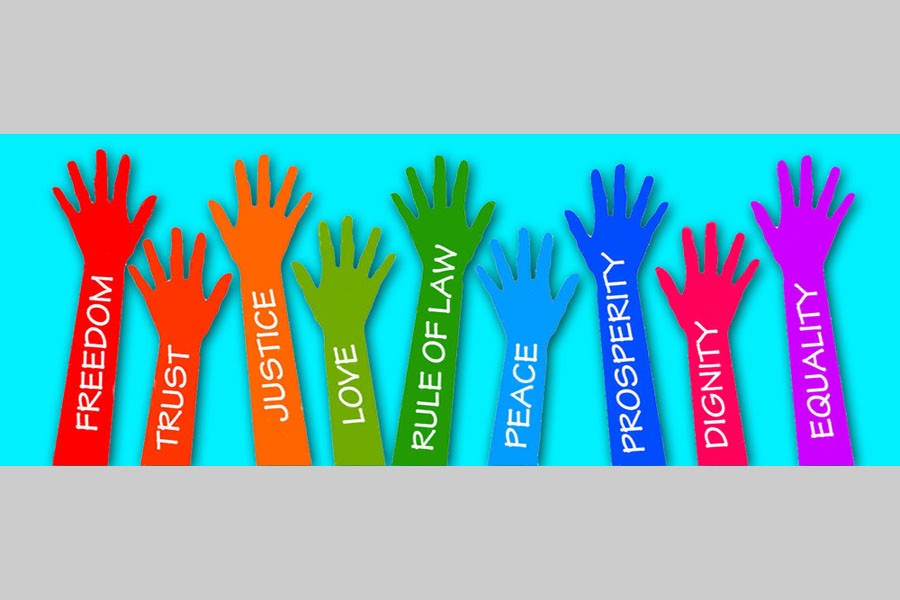There is no greater virtue than self-preservation. A nation that feels deprived of its rights and privileges may not have the inborn instinct for freedom because disparate individuals have their family upbringing, educational qualifications, cultural orientation and intellectual wavelengths at different levels. Unless there is a catalytic force to bring them together, their response as a singular motivation and will power do not emerge as a deciding factor. In 1971, the Bangalees of this part of the world strongly responded in unison to the exploitation and depravation they suffered at the hands of the Pakistani myopic rulers.
The ragtag nationhood of geographic entities more than one thousand miles apart was forged artificially on religious oneness. But it was more to serve political expediency than any purpose based on genuine religious fraternity, material well-being and recognition of each individual's human rights and equal opportunities. Denial of a language rated seventh in the world in terms of population and the first Asian to receive the prestigious Nobel Prize could not be considered a more foolish move than shifting foreign exchange garnered from jute to the western wing for its faster development.
The so-called political leaders who were ready to serve their masters in West Pakistan thought it safe to advance their personal interests and did so at the cost of the Bangalee population's interests in this part. Right at this juncture of history a towering political figure in the shape of Sheikh Mujibur Rahman appeared on the centre stage of politics. He was indeed the catalyst to unify the Bangalee ethos. Thus the population's right to freedom and self-determination got its unwavering voice. This acted as the stream of consciousness and the war had been won on the collective psychological front before it was won on the political and battle fields.
Now the question is, if the same principles of integrity of mind could be preserved to take ahead socio-economic reform programmes in the post-liberation period. The answer to the question is a big No. First counter-revolution by the defeated forces and their foreign conspirators and collaborators who were sworn enemy to socialism were looking for revenge and revenge did they take by annihilating the man who gave the nation its freedom. Derailed the statecraft drifted out of its stated course and the country became a witness to retrogression in cash and kind. So rotten was the politics that the razakars were rehabilitated to ministerial positions -quite an act of desecration of the martyrdom of the millions.
With this the revisionists staged a comeback and the country is still paying through its nose for the folly. Today, the militants pose a threat to social fabric, economic disparities eat into the very vital of national solidarity and patriotism. Political opportunism reigns supreme and the mediocre rule the roost at all levels of society. Indifference to merit has deprived the nation of contribution by creative minds and genius. This nation has simply failed to foster the resourceful; instead it has promoted the tricksters, contriving elements and the subservient to cause gave harm to the nation's cause.
From self-preservation to self-sacrifice, it is a long process and one that is ennobling but then touching the lives of the wretched and hapless instead of advancing self interests is still a long way off. This nation now needs to dedicate itself to this arduous task of ensuring equalitarian dispensation of economic and social justice. On the eve of the 47th Victory Day, the nation stands on the threshold of the league of nations called middle-income countries. Its promotion to the select group may not be far off but the next target is to achieve the sustainable development goals (SDGs). It is said to be on course for that elevation too. Poverty reduction is appreciable too.
Yet something is missing from the agenda. Poverty reduction at the marginalised and vulnerable segment of society makes sense but its range and scope are hardly commensurate with wealth creation in the country. Accumulation of wealth at the upper level of society is growing in leaps and bounds but the extreme poor have to be helped out under the social safety-net programme. This is indicative of the fact that the country is yet to devise any proven social strategy or mechanism for quite a significant portion of its population so that it becomes reasonably productive. In a country where more than half of the population enjoys greater purchasing power, it is not difficult to devise ways and means good enough for the backward segments to change their lot.
Before devolution of power, therefore, there is need for devolving education. Now that education has been commercialised to its teeth, the poor and vulnerable people are more at a disadvantage to educate their children. Clearly, the system of education favouring children from poor and marginalised families ought to be put in place. In general education has to inspire creativity and ensure easy access to education for the poor and meritorious. Social contents calls for streamlining so much so that the system keeps open the avenue to continuously lift the backward communities out of their abject slots. Those who broke the barrier of self interest to lay their lives at the altar of the motherland did so in the hope that the posterity will live in dignity with their human rights ensured against all odds. If their dreams are relived, the nation will march forward without backlogs.


